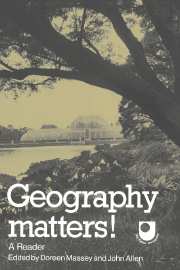Book contents
- Frontmatter
- Contents
- Acknowledgements
- Part 1 Introduction: Geography matters
- Part 2 Introduction: Analysis: aspects of the geography of society
- 3 ‘There's no place like…’: cultures of difference
- 4 The spaced out urban economy
- 5 Jurisdictional conflicts, international law and the international state system
- Part 3 Introduction: Synthesis: interdependence and the uniqueness of place
- Part 4 Introduction: Geography and society
- Index
3 - ‘There's no place like…’: cultures of difference
Published online by Cambridge University Press: 05 June 2012
- Frontmatter
- Contents
- Acknowledgements
- Part 1 Introduction: Geography matters
- Part 2 Introduction: Analysis: aspects of the geography of society
- 3 ‘There's no place like…’: cultures of difference
- 4 The spaced out urban economy
- 5 Jurisdictional conflicts, international law and the international state system
- Part 3 Introduction: Synthesis: interdependence and the uniqueness of place
- Part 4 Introduction: Geography and society
- Index
Summary
There is a mundane level at which everyone is familiar with a geography of British culture. To visit a museum, art gallery, theatre or cinema is to be confronted by the geography of cultural institutions. Trips to the town or city centre consume time and money. To live outside London involves a recognition of the concentration of cultural resources and institutions of all kinds which divides the ‘metropolis’ from the ‘provinces’. To visit Blackpool and Eastbourne is to encounter the diverse sources of pleasure that are associated with British holidays.
These patterns bear the mark of social processes. Here, the ‘civic pride’ of nineteenth-century philanthropists who stamped their mark on city centres with galleries and museums, and there the ‘economic rationality’ of the cinema chains, closing the old suburban ‘flea-pits’ and developing the city centre multiple-screen complexes. Space and place are essential elements in the patterns of British culture, and one of their most profound effects is to be found in the way they structure cultural diversity. Blackpool and Eastbourne offer different holiday pleasures, not solely because of where they are, but because of the different social groups whose holiday needs they cater for. The bank holidays and wakes weeks of a Northern working class, stretched for fifty weeks a year by labour and poverty, required an intensity of sensation and satisfaction garishly reflected in the distorting mirrors of Blackpool's ‘cheap thrills’.
- Type
- Chapter
- Information
- Geography Matters!A Reader, pp. 54 - 67Publisher: Cambridge University PressPrint publication year: 1984
- 3
- Cited by



